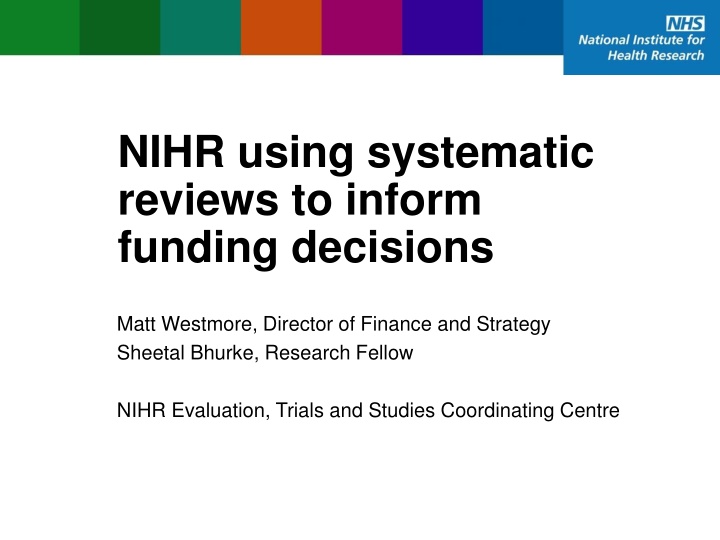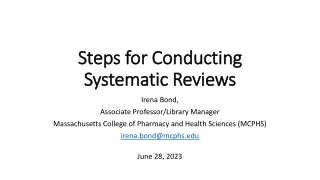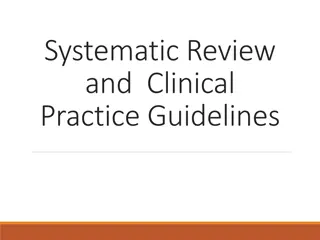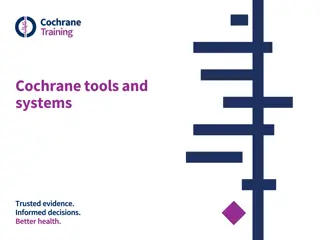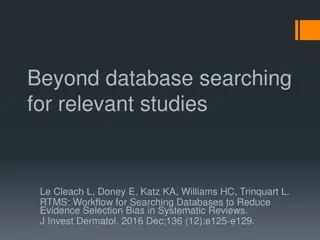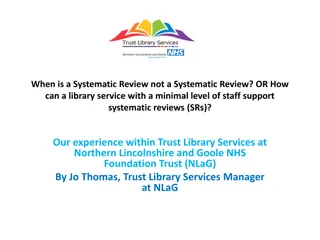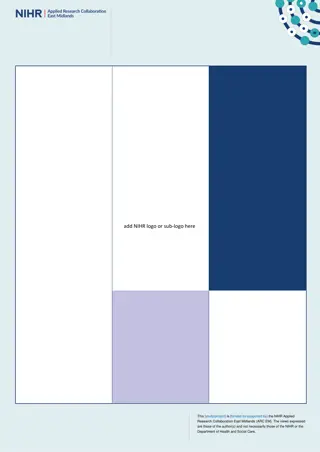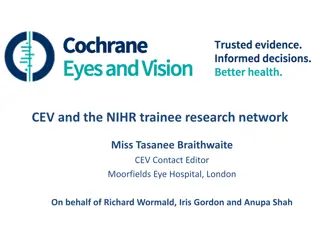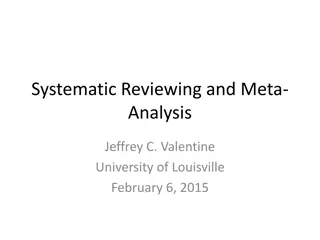NIHR Systematic Reviews for Funding Decisions
NIHR is a major funder of applied health research, emphasizing the importance of basing new research on credible systematic reviews. Funding decisions rely on existing evidence, with reviews crucial for defining methodologies and supporting research questions. By ensuring methods are transparent and minimize bias, NIHR aims to reduce the avoidable waste of health research funding. Peer-reviewed systematic reviews not only inform funding decisions but also add value to research outcomes.
Download Presentation

Please find below an Image/Link to download the presentation.
The content on the website is provided AS IS for your information and personal use only. It may not be sold, licensed, or shared on other websites without obtaining consent from the author.If you encounter any issues during the download, it is possible that the publisher has removed the file from their server.
You are allowed to download the files provided on this website for personal or commercial use, subject to the condition that they are used lawfully. All files are the property of their respective owners.
The content on the website is provided AS IS for your information and personal use only. It may not be sold, licensed, or shared on other websites without obtaining consent from the author.
E N D
Presentation Transcript
NIHR using systematic reviews to inform funding decisions Matt Westmore, Director of Finance and Strategy Sheetal Bhurke, Research Fellow NIHR Evaluation, Trials and Studies Coordinating Centre
Funding Acknowledgement: This work was funded by the NIHR Evaluation, Trials and Studies Coordinating Centre Department of Health Disclaimer: The views and opinions expressed therein are those of the authors and do not necessarily reflect those of the NIHR, NHS or the Department of Health. Emerging findings The results presented here are still subject to peer review and so should be considered emerging findings
Summary NIHR is a major funder of applied health research New primary research will only be funded if it is based on a review of existing evidence Reviews are used to support the research question and define methodology 70-75% of funded trials explicitly referenced a review in their applications as justification for the research question 100% of funded trials that could, referenced a review to inform the research question and/or design
85% of Health Research Funding is wasted avoidably Sir Iain Chalmers and Paul Glasziou Avoidable waste in the production and reporting of research evidence , The Lancet, Volume 374, Issue 9683, Pages 86 - 89, 4 July 2009,
Adding Value in Research Framework Google NIHR adding value in research framework
Google NIHR adding value in research framework http://www.nets.nihr.ac.uk/__data/assets/pdf_file/0006/77217/Guidance-notes_literature- review.pdf
What do we mean by a systematic review New primary research will only be funded if it is based on a review of existing evidence that is credible to your peers and: Is completed according to a predetermined methodology Methodology is adequately described to allow, in principle, replication by others Has well defined and justified inclusion and exclusion criteria Minimises bias and random error in a way proportionate to the risk of an inappropriate funding decision Maximises completeness in a way proportionate to the risk of an inappropriate funding decision References ongoing studies Critically appraises for quality and relevance Synthesises
Who does what? If it is a commissioned call we have done it so applicant does not have to. If not applicant does it If a published review exists use it adding in any more recent studies If a published review does not exist review the evidence systematically We check
Bhurke et al Are Health Technology Assessment (HTA) funded trials using systematic reviews to inform their design? A retrospective cohort 2006-9 2013 Did not reference a systematic review 5 trials (11%) 0 trials (0%) Referenced a systematic review 42 trials (89%) 34 trials (100%) Referenced more than one systematic review 30 trials (77%) 20 trials (65%) Total Cochrane reviews referenced 27 16 EMERGING FINDINGS SUBJECT TO PEER REVIEW
Cohort I Number (%) (n = 42) Cohort II Number (%) (n = 34) What were they used for? Adverse events 7 (16.6) 1 (2.9) Choice of frequency/dose 2 (4.7) 1 (2.9) Duration of follow-up 1 (2.3) 2 (5.8) Estimating the control group event rate 2 (4.7) 0 (0) Estimating the difference to detect or margin of equivalence 2 (4.7) 1 (2.9) Inform standard deviation 0 (0) 3 (8.8) Intensity of interventions 1 (2.3) 1 (2.9) Justification of prevalence 3 (7.1) 0 (0) Justification of treatment comparison 38 (90.4) 32 (94.1) Recruitment and consent 4 (9.5) 1 (2.9) Route of intervention 0 (0) 1 (2.9) Selection of definition or outcome 5 (11.9) 5 (16.1) EMERGING FINDINGS SUBJECT TO PEER REVIEW Withdrawal rate 1 (2.3) 0 (0)
Summary NIHR is a major funder of applied health research New primary research will only be funded if it is based on a review of existing evidence Reviews are used to support the research question and define methodology 70-75% of funded trials explicitly referenced a review in their applications as justification for the research question 100% of funded trials that could, referenced a review to inform the research question and/or design Thank you
